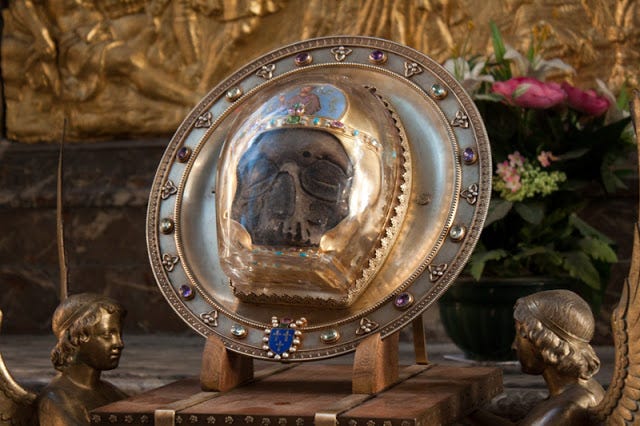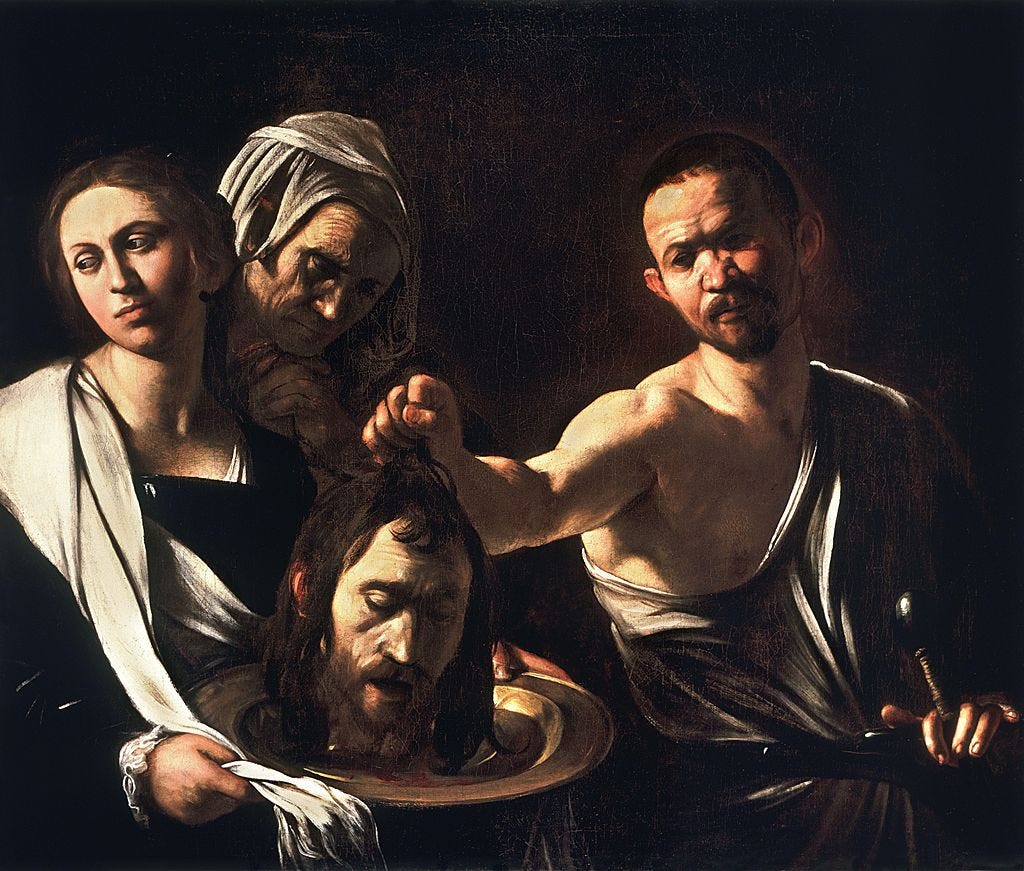Daily Readings | 24 Feb 25 | Death & Life in Jesus; John the Baptist, the New Elijah
Scripture Readings: 2 Cor 4:6–15; Matt 11:2–15
Saint/Feast Day: First and Second Findings of the Head of St. John the Baptist

St. John the Forerunner of our Lord was beheaded by King Herod at the instigation of his wife Herodias. Joanna, wife of Chuza, Herod’s steward recovered John’s head and buried it with honour. The relic was passed through private hands until it came to rest, by Divine Providence, in the care of bishop Ouranios of Cappadocia. In the ninth century it was translated to Constantinople. The finding and veneration of this precious relic is testimony to the importance to Christians of St. John, looked upon as father of ascetics and foremost of the witnesses to Christ.
From L. Farley, Eastern Saints.
Troparion: “Taken out of the earth, the head of the Forerunner radiates incorruptibility and brings healing to the faithful. In heaven it gathers together the Choirs of Angels, while one earth, it invites the whole world to sing with one voice the glory of Christ God.”
From Publicans Prayerbook
Readings: 2 Cor 4:6–15; Matt 11:2–15
Today I want to discuss the importance of John the Baptist in Christian belief, specifically as the forerunner for the Christ and the anticipated coming of Elijah, and then briefly mention some historicity of John and his death.
John as the New Elijah
Typological understandings of figures in the New Testament is not a novel concept; we see it extensively in the Gospels (e.g., Jesus as a New Moses; consult D. Allison, The New Moses). We also see it in the Early Church fathers when discussing the significance of Jesus and his fulfillment of the OT patriarchs:
"Accordingly, if you desire to perceive the mystery (µυστήριον) of our Lord, pay attention to Abel who was similarly killed, to Isaac who was similarly bound, to Joseph who was similarly sold…" (Melito of Sardis, Peri Pascha 59)
We are not examining Jesus today, though. Instead, we are looking at the scriptural fulfillment of John the Baptist and the coming of Elijah.
If we look at our scripture readings for today—Matt 11:10—the First Evangelist wrote,
This is he of whom it is written,
‘Behold, I send my messenger before thy face,
who shall prepare thy way before thee.’
This is a conflated quotation taken from the Prophets Malachi and Isaiah:
Behold, I send my messenger, and he will prepare the way before me. And the Lord whom you seek will suddenly come to his temple; and the messenger of the covenant in whom you delight, behold, he is coming, says the Lord of hosts. (Mal 3:1)
A voice cries:
“In the wilderness prepare the way of the Lord;
make straight in the desert a highway for our God…” (Isa 40:3)
Both of these books were understood in Early Judaism to anticipate the coming of the Messiah (the Christ) and the Day of the Lord. These two quotation, though, do not provide us with any anticipation of Elijah or that he must come first.
Let us now return to Matthew before we delve into that topic because he leads us to this expectation. In 11:13–14, the Gospel writer makes this explicit:
|13| For all the prophets and the law prophesied until John; |14| and if you are willing to accept it, he is Eli′jah who is to come.
We can see here that Matthew clearly has an understanding of the Prophets anticipating another who is to come before the Messiah; and, that figure is John the Baptist, the New Elijah.
This though can be witnessed both later in Malachi and the Deuterocanonical Book Sirach:
Behold, I will send you Eli′jah the prophet before the great and terrible day of the Lord comes. (Mal 4:5)
Then the prophet Eli′jah arose like a fire,/ and his word burned like a torch… you who are ready at the appointed time, it is written,/ to calm the wrath of God before it breaks out in fury,// to turn the heart of the father to the son,/ and to restore the tribes of Jacob. (Sir 48:1, 10)
Post-exilic Judaism anticipated the restoration of the Davidic Kingdom, and this would happen with the coming of the Messiah.
Elijah, one of the greatest of the prophets, was anticipated to help prepare this fulfillment. And here, we see that Matthew interprets these passages as referencing John the Baptist.
The Gospel makes this explicit right after the Transfiguration,—where Elijah and Moses appear—as Jesus and the disciples are descending the mountain:
|10| And the disciples asked him, “Then why do the scribes say that first Elijah must come?” |11| He answered, “Elijah does come, and he will restore all things. |12| But I tell you that Elijah has already come, and they did not recognize him, but did to him whatever they pleased. So also the Son of Man will certainly suffer at their hands.” |13| Then the disciples understood that he was speaking to them of John the Baptist.
The coming of this Kingdom, though, did not come about as first century Jews would have thought—as I have been discussing in the Daily Readings of late and my recent post on wine and kingdom (though, specifically in Mark rather than Matthew). All that to say, John the Baptist, too, was an anticipated figure that did not necessarily become the Elijah most would have expected.
As R. T. France (Matthew, 432) comments,
Perhaps it is the startling christological implications of this claim which explain the uncharacteristically coy tone of the opening clause, “If you are willing to accept it.” To accept that John is the returning Elijah is to embrace a whole package of eschatological fulfillment in Jesus for which clearly most of those who heard him were not yet ready—cf. the unresponsiveness of “this generation” which will be condemned in vv. 16–19.
The Death of John the Baptist
I will not be explicating these passages from the Synoptics, but I did want to show that John the Baptist’s death is recorded in literature outside of the New Testament—though, I have written a lengthy post on Mark’s account.
Here, if you wish to read the accounts of John’s death, they are presented below:
Mark’s version is the most thorough, yet Matthew and Luke truncated the story in their own narratives.
What I want to show now is the record from Josephus, an early Jewish historian (AD 37–100), who also tells of John the Baptist’s death:
Now, some of the Jews thought that the destruction of Herod’s army came from God, and that very justly, as a punishment of what he did against John, that was called the Baptist; for Herod slew him, who was a good man, and commanded the Jews to exercise virtue, both as to righteousness towards one another, and piety towards God, and so to come to baptism; for that the washing [with water] would be acceptable to him, if they made use of it, not in order to the putting away [or the remission] of some sins [only], but for the purification of the body; supposing still that the soul was thoroughly purified beforehand by righteousness. Now when [many] others came in crowds about him, for they were very greatly moved [or pleased] by hearing his words, Herod, who feared lest the great influence John had over the people might put it into his power and inclination to raise a rebellion (for they seemed ready to do anything he should advise), thought it best, by putting him to death, to prevent any mischief he might cause, and not bring himself into difficulties, by sparing a man who might make him repent of it when it would be too late. Accordingly he was sent a prisoner, out of Herod’s suspicious temper, to Macherus, the castle I before mentioned, and was there put to death. Now the Jews had an opinion that the destruction of this army was sent as a punishment upon Herod, and a mark of God’s displeasure to him. (Antiquities of the Jews 18.5.2, transl. by William Whiston)
The accounts are not identical, but it is a source that corroborates the existence of John, his baptismal work, and his death at the hands of Herod.
If you have enjoyed this brief reflection on today’s Byzantine readings and wish to read more about NT studies, would you kindly share this post and subscribe.







